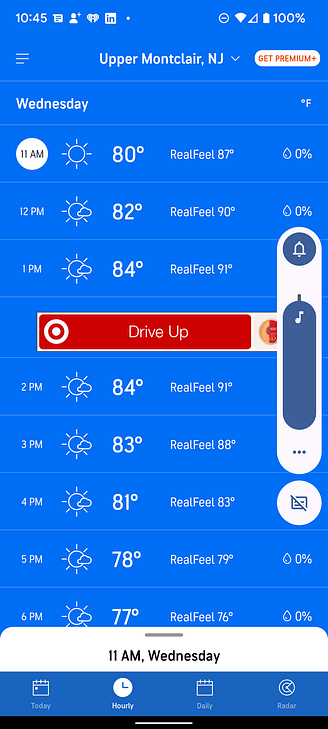
Jul 15, 2022
Submitted by:
Gene Sower
Samson Media
(973) 744-6621
production@samsonmedia.net
WHAT IS GEO-TARGETING?
You may have heard about geo-targeting, geo-fencing or geo-tracking as an aspect of targeted advertising. For the purposes of this blog post, will just refer to it as “geo-targeting.”
But what is geo-targeting exactly? And how can it help your business?
Well, without getting super technical and getting lost in the weeds, geo-targeting, is the technical ability to target consumer behavior and show hyper-relevant online ads based on the location of the user. This is done via smartphone technology that can detect where consumers travel throughout their day. This is done within privacy guidelines of the various apps on the smartphone and doesn’t target Jane Smith as an individual person, per se, but it knows that Jane’s smartphone went into a specific local tile store or restaurant.
WHERE DO GEO-TARGETING ADS APPEAR?
Geo-targeted ads appear on smartphone apps such as:
- Weather
- Sports
- News
- Entertainment

In this weather app you can see the ad for Target (Drive up) in red in the center.
Ad sizes vary from small banners like the Target example above to full-screen ads that take over the screen, and even video. Apps, especially free ones, sell advertising inventory just like websites, Facebook, TV, radio, and print magazines. That’s how they make money since the apps are free to use. Premium apps sell subscriptions so you will rarely see ads on paid or “premium” apps. It’s sort of like the difference between Netflix and broadcast TV.
WHEN DO GEO-TARGET ADS APPEAR?
Geo-targeting ads usually start to appear on the user’s apps within 24 hours. So if Jane walks into a hardware store, she will begin to see hardware-oriented ads on her apps within 24 hours. While the timing may vary, the ads will then be used to retarget Jane and show the same ad when she uses her desktop computer or tablet following her in-store visit.
That’s right. Geo-targeting campaigns can be used to jump from smartphones to websites to provide repeated exposure to a particular offer by appearing on the inventory across relevant websites. Notice I said RELEVANT websites. That hardware ad that appeared in the weather app after visiting a hardware store will now appear on a home improvement website that Jane visits afterward.
HOW ARE GEO-TARGETED LOCATIONS TARGETED?

One of the really great things about geo-targeting is that your target locations can be targeted with pinpoint accuracy. This is done by literally entering the complete street address of the location the client’s ads want to target. It can be as targeted as the four walls of a specific location to a 1/2 mile around a mall, car dealership, supermarket, restaurant, etc.
This ensures that the client’s ads are only triggered when someone enters the specific location entered into the campaign.
Keep in mind that targeted locations can include a competitor’s place of business. Talk about a competitive advantage!
Keep in mind that targeted locations can include a competitor’s place of business.
GEO-TARGETING EXAMPLE
Some recent success stories include a tuxedo rental company offering a discount for wedding tuxedos during the busy spring season. We targeted wedding venues as well as other tuxedo companies with a discount offer described in the ads, that when clicked, went to a specially-created landing page with the discount coupon offer.
Since the discount offer and the landing page were unique to the campaign, not only could we measure how many offers were redeemed but we could also see how many people visited the special landing page based on their Google Analytics account.
Because the wedding campaign was so successful we switched to a prom rental campaign but this time we geo-targeted a list of 10 area high schools in addition to some tuxedo rental competitors. Another success. I mean, what high school student doesn’t have a smartphone?!
HOW TO MEASURE GEO-TARGETING RESULTS?
- Key Performance metrics for any geo-targeting campaign include:
- Impressions – How many people see your ad
- Clicks – How many people clicked your ads
- CTR or Click Through Rate – The percentage of people who saw your ad, and clicked your ad
- Google Analytics – Measure page visits to a specially-created page made just for the campaign
But wait —- there’s more!
But the stat I love the most is that you can even track in-store visits based on who saw the ad on their smartphones. That’s right — in-store visits based on app views are tracked and accounted for in the stats dashboard.
So a typical stat after a week might be 20,000 impressions, 100 clicks, for a .005 click-through rate, and 5 store visits.
Every geo-targeting ad campaign includes a dashboard to measure your campaign results. But we recommend also comparing your geo-targeting ad stats with your Google Analytics page traffic. That’s why each campaign requires a unique landing page that be measured by Google Analytics. By being a unique landing page that is only viewable when someone clicks a campaign ad, it provides additional insight into measuring the traffic being sent to your offer.
HOW ARE GEO-TARGETING ADS CHARGED?
Unlike more expensive online advertising platforms like Google Pay Per Click which is based on bidding on keywords. our geo-targeting campaigns are billed at around $4 and change per 1,000 impressions. So for every 1,000 people who see your ad, your costs are the same whether you receive 10 clicks or 100. Campaigns can be started for as little as $500 a month in ad spend. This also means that the most important part of each geo-targeted campaign is creating a highly targeted and RELEVANT ad campaign that will attract notice, generate clicks, and inspire a purchase.
MORE INFO ON GEO-TARGETING
To get a complete list of the available apps that can be used and more information on pricing, etc. Please visit our GEO-FENCING page HERE
